General
Minister Janet Museveni Lays Foundation Stone for School of Graduate Studies Building, Commissions the School of Law Building and the renovated Lumumba Hall
Published
1 year agoon
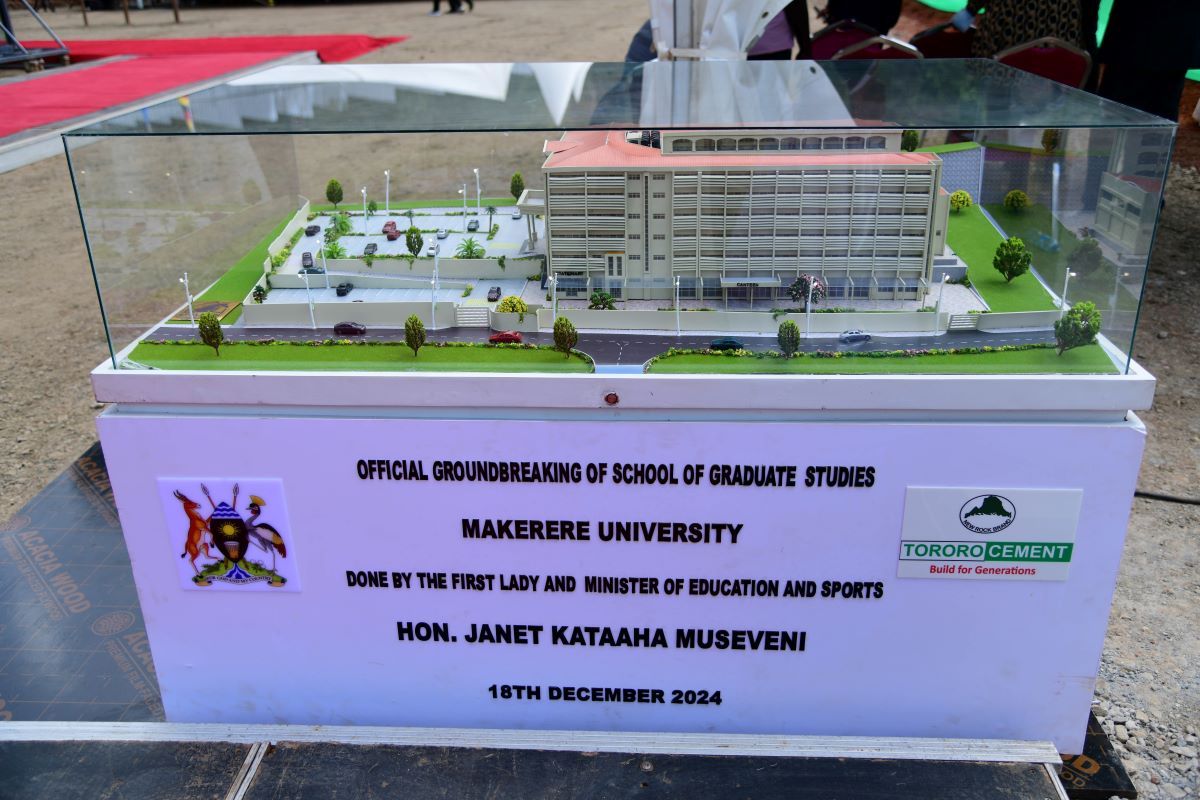
The First Lady and Minister of Education and Sports, Hon. Janet Kataaha Museveni, has laid the foundation stone for Makerere University’s School of Graduate Studies building, whose construction is now underway.
The Minister laid the foundation stone for the USD8 million project during a brief function held on Wednesday 18th December 2024 at the site opposite Makerere University’s Lumumba Hall. The event was attended by several dignitaries, including the State Minister for Primary Education, Hon. Joyce Moriku Kaducu, University Council Chairperson Mrs. Lorna Magara, and Makerere University Vice Chancellor, Professor Barnabas Nawangwe.
Others in attendance included Acting Deputy Vice Chancellor of Finance and Administration, Professor Henry Alinaitwe; Acting Deputy Vice Chancellor of Academic Affairs, Professor Buyinza Mukadasi; University Secretary Mr. Yusuf Kiranda; Dean of Students Winfred Kabumbuli; Guild President Vincent Lubega Nsamba; and the Vice Guild President, Joy Eve Serunjogi among others.
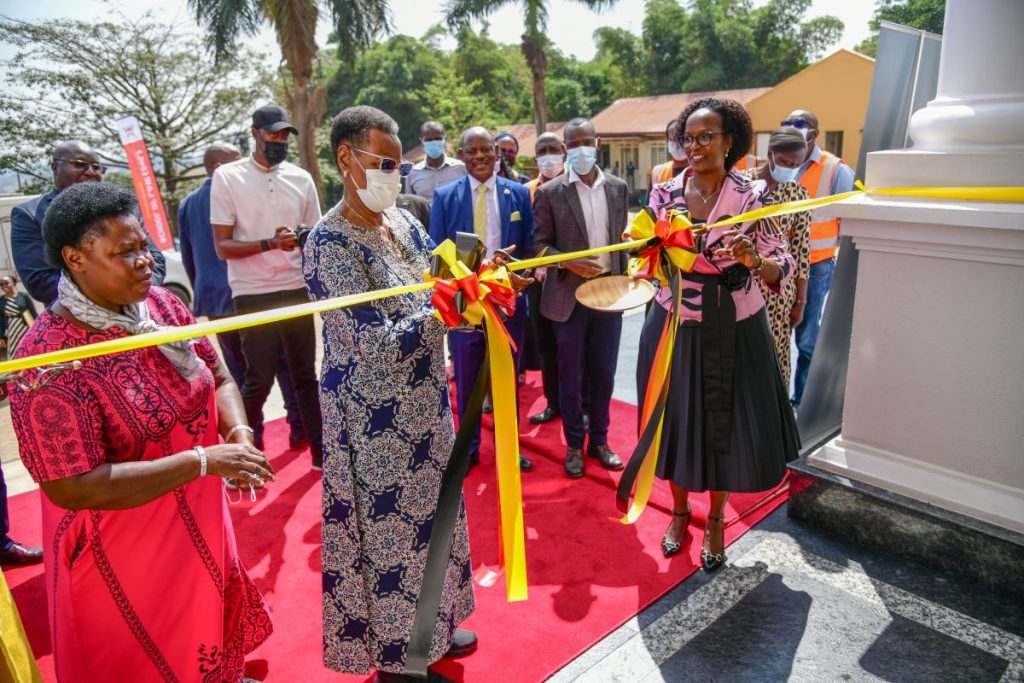
The building is a donation (in-kind) from the late Hasmukh Patel, an industrialist and former Chairman of Tororo Cement who passed away on August 29, 2024, after a short illness. The journey to this befitting donation to Makerere University started in December 2022, when Hasmukh Patel accompanied by some members of his family and friends visited the Vice Chancellor, Prof. Barnabas Nawangwe to declare his donation. From December 2022, a number of meetings were convened involving the Minister of Education and Sports, the University leadership, Mr. Hasmukh Patel, his family and Tororo Cement regarding this donation. Living true to his commitment during those meetings, his family and Tororo Cement are implementing his wishes to construct the building, which will house the School of Graduate Studies at Makerere University.
Before laying the foundation stone for the School of Graduate Studies building, Hon. Janet Museveni first unveiled a plaque to officially open the new building for the School of Law. She then headed to Lumumba Hall, where she unveiled another plaque marking the completion of its renovation.
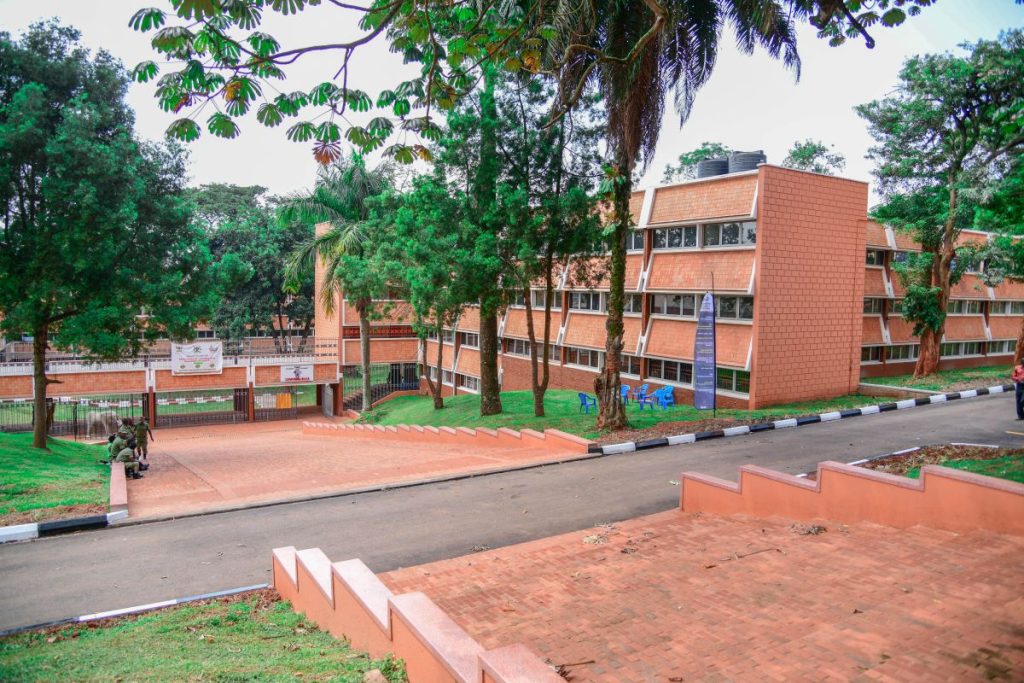
The First Lady, who had initially laid the foundation stone for the School of Law building on May 17, 2022, returned to the main campus to officially open the completed structure. Funded by the Government of Uganda to the tune of UGX 7.3 billion, the new three-storeyed building features lecture rooms, tutorial and seminar rooms, a library, a moot court, offices, a cafeteria, a lactation room, and other teaching and learning facilities. Construction was undertaken by M/S CK Associates, with Symbion serving as a consultant.
The renovation works for Lumumba Hall commenced in June 2023, with the site handed over to the contractor, National Enterprise Corporation (NEC). Funded by the Government of Uganda to the tune of UGX 9 billion, the project involved extensive renovations to restore Lumumba Hall to its original splendor. Lumumba Hall now accommodates about 725 students.
Lumumba Hall was the first hall of residence to undergo renovation, followed by Mary Stuart Hall, which has also been handed over to NEC for refurbishment. These renovations, which began last year, are a result of the Government of Uganda’s efforts to improve the nine (9) halls of residence at the main campus.
Speaking at the event, Hon. Janet Museveni thanked the University Council and management for their dedication to rebuilding the institution. She expressed confidence that the physical restoration efforts would also rebuild the character of young people.
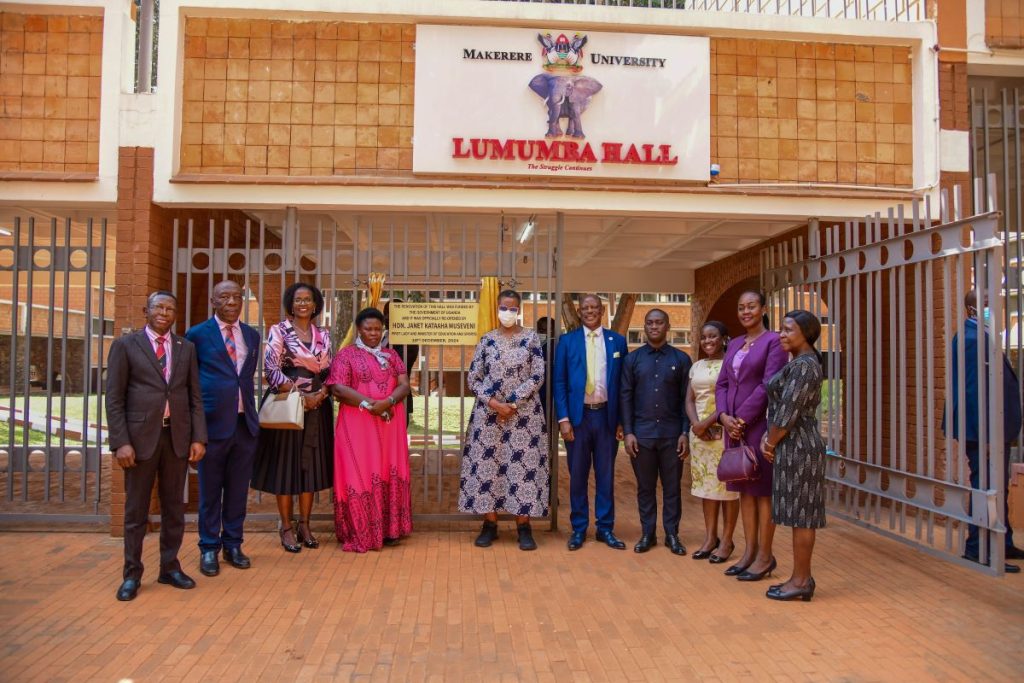
“There is a restoration of dignity that comes to an institution or a community when we choose to rebuild and it is not only physical, there is a spiritual restoration that comes as well. For Nehemiah, it was not just the rebuilding of a physical wall it was the rebuilding of broken lives and a broken covenant. It was the rolling away of the reproach they had suffered as a nation,” she said.
Adding; “I therefore salute the Council and the management of Makerere for your dedication to the rebuilding of this University. I am confident that as you rebuild physically, you are rebuilding the character of our young people. My prayer is that the physical restoration is translating into the spiritual restoration of this great institution.”
The first lady, Hon. Janet Museveni recalled her earlier visit to Makerere University, where she observed the dilapidated state of the halls of residence, which prompted her to initiate the renovation works.
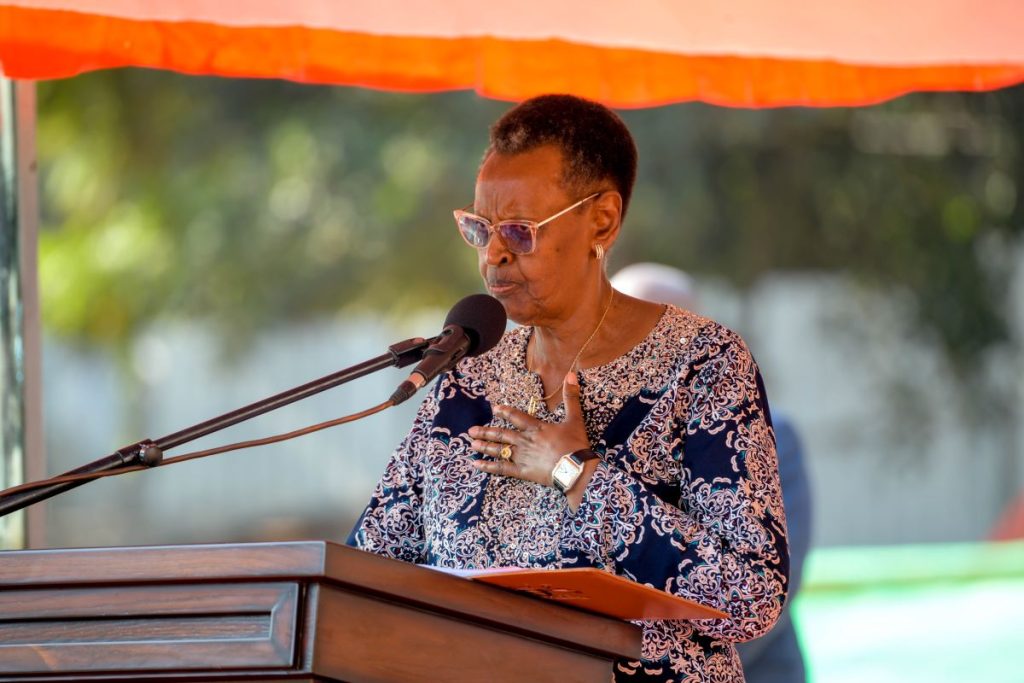
“I remember taking a tour of the halls of residence in this University and Kyambogo University in the thick of the COVID-19 pandemic. My heart bled when I saw the state of the halls of residence. Like Nehemiah, I took my burden to the Lord and now see what the Lord has done! Commissioning of the refurbished Lumumba Hall today is a testament to the faithfulness of our God. It is even more gratifying to know that other projects are ongoing and these include: the renovation of Mary Stuart Hall, the construction of the Perimeter Wall, and improvements at the University Hospital, including setting up an operating theatre and ICU.” She said.
Hon. Janet Museveni also expressed gratitude to the Vice Chancellor, Prof. Barnabas Nawangwe, for his leadership, which facilitated the realization of the Tororo Cement project. “This Project would not have been possible without the guidance and leadership of the Vice Chancellor of Makerere University, Prof. Nawangwe, who drew my attention to this offer by Tororo Cement, and requested me to endorse this Project, which will be named after Mr. Hamukh Patel,” she said.
Adding: “I am informed that the construction of this building is estimated to cost 8 Million US dollars and will consist of: lecture and seminar rooms, smart classrooms, laboratories, an innovation space, a conference hall, offices and other facilities. We remain forever grateful for this donation, which will increase access and contribute to improving the quality of postgraduate education.”
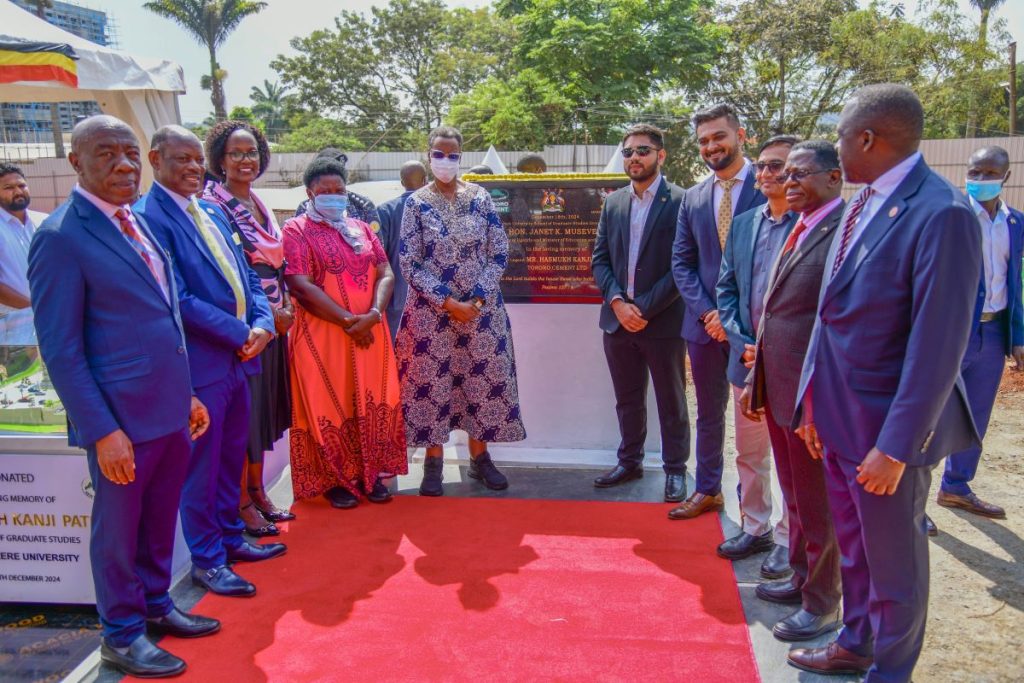
Speaking at the event, Vice Chancellor Prof. Nawangwe commended Hon. Janet Museveni for prioritizing the development of Makerere University, which has seen remarkable progress under her leadership. “Hon. Minister, from the time you took over the Office of Minister of Education and Sports and the Higher Education Sector, Makerere University in particular has transformed tremendously. Most notable is the infrastructure revolution at Makerere. On several occasions, you have come to Makerere to lay the foundations for new buildings and to open completed buildings, including our iconic Main Administration Building,” he said.
“When you inspected the halls of residence in 2021, I could see the frustration in your eyes, looking at the dilapidated state the halls were in, especially Lumumba, part of which had been condemned for 2 years,” Prof. Nawangwe said.
“Hon. Minister, I am sure that today, after seeing the glamorous new building for the School of Law and the glittering renovated Lumumba Hall, you are in a completely different mood compared to that visit in 2021. We are as delighted as you must be and your efforts are the reason for our happiness today. Our law students and professors can now comfortably study, work and conduct research in the best building for any school of law that I have seen,” Prof Nawangwe added.
Reflecting on the Graduate School Building, Prof. Nawangwe recalled when he received a proposal from Mr. Hasmukh Patel in 2022 who had initially intended to donate the Main Administration Building, which had been destroyed by fire, but opted to donate School of Graduate Studies Building after finding that the main building reconstruction had already started.
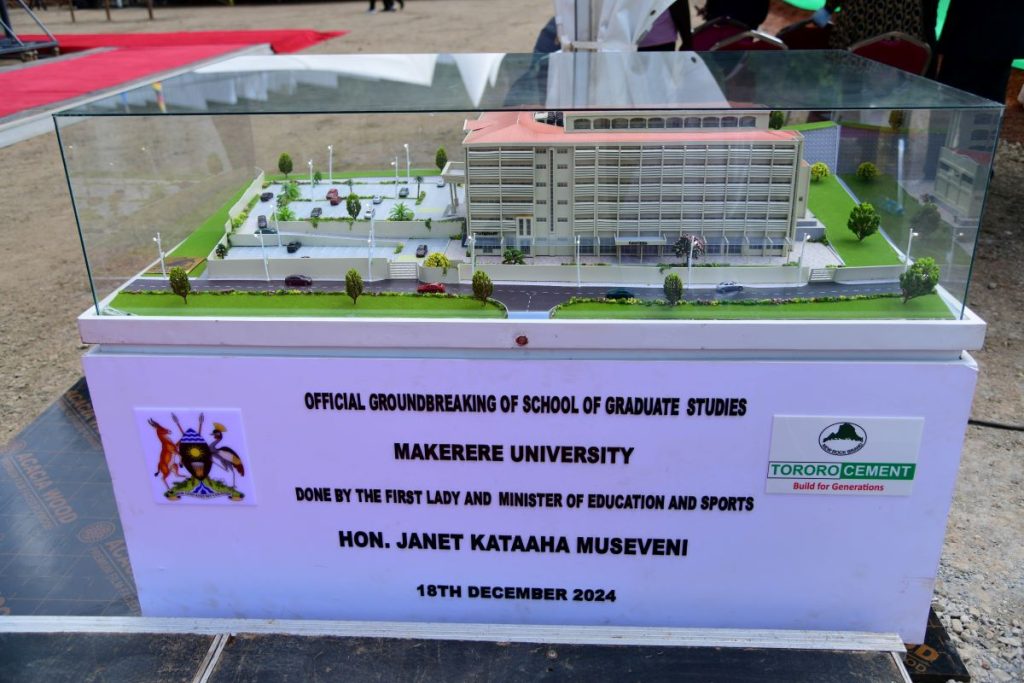
“Hon. Minister, in the morning of 13th December 2022, a miracle happened in my office in the Frank Kalimuzo Building. General David Muhoozi and Major General Apollo Gowa walked into my office with the Late Hasmukh Patel. Gen. Muhoozi introduced Mr. Hasmukh Patel as the Chairman of Tororo Cement, who after learning about the destruction by a fire of our Main Administration Building, expressed the wish to reconstruct that iconic building. On reaching Makerere, Mr. Hasmukh Patel found a contractor already on site, and he told us, that he would all the same donate a building to Makerere University as a gift on our 100th anniversary,” Prof Nawangwe said.
“He said it in such a simple way, that I thought I was dreaming. That evening, at the invitation of Mr. Patel, I visited the building that Mr. Patel had built for a school at Bukoto and I told him that a similar building for Makerere would be just what we needed for our School of Graduate Studies and Research that we needed. The University Council unanimously voted to thank Mr. Patel for his magnanimous offer and, you, Maama Janet graciously endorsed the project. I later visited Mr. Patel in Mombasa and was amazed at the humanitarian work he was doing among the communities. He was such a rare human being,” Professor revealed.
“Today we are here to witness the laying of the foundation stone for this, the largest academic building at Makerere University, and the first such donation I know by an African philanthropist to a university in Africa. The building will have lecture and seminar rooms, a conference hall, innovation spaces, PhD student rooms, computer and other laboratories, a restaurant, staff offices and other facilities. I thank Tororo Cement and the family of the Late Hasmukh Patel for honoring his wish and I wish to assure Mr. Patel, who must be in heaven smiling at us, that we will honor his legacy in this building and that we will put the building to its best use in the service of humanity, which is what Mr. Patel lived for,” Prof Nawangwe added.
On her part, the state Minister for Primary Education, Honorable Joyce Moriku Kaducu acknowledged Hon. Janet Museveni for prioritizing the Education sector in her leadership, which has led to the tremendously development of the sector.
“On behalf of the education sector, we want to thank you as the mother of the nation, indeed you are a big gift and a blessing to the nation and education at large, all this achievement would not have been possible if it was not under your visionary leadership and the guidance you have offered,” Minister Kaducu said.
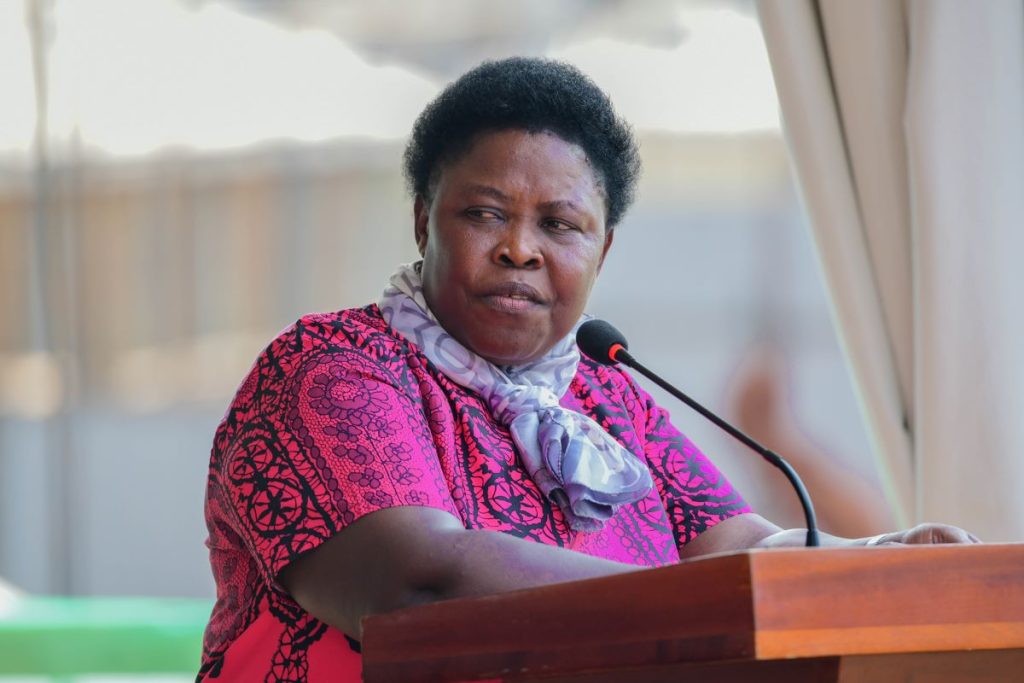
Hon. Kaducu also hailed Makerere University for playing a very critical role in sensitizing, disseminating knowledge, and raising awareness to the public on the message of the Parish Development Model, which is intended to create wealth among citizens.
“As President Museveni is preaching the message of wealth creation, I want in a special way to thank Makerere University for playing a very critical role in sensitizing, disseminating knowledge, and raising awareness to the public on the message of the Parish Development Model (PDM), and they have a committee that monitors and informs government. They are indeed part of the team promoting wealth creation in this country,” she said.
Mrs. Lorna Magara, the Chairperson of the Makerere University Council said that the construction of the Graduate studies building speaks to the University’s mission of being a research-led institution because it comes as a dedicated building to house the Directorate of Research and Graduate Training, which marks the resolution of a critical gap in our institutional framework
“At the heart of Makerere University’s current strategy is the promotion of a research-led institution, with a strong focus on graduate training. The establishment of a dedicated facility for the School of Graduate Studies, which also houses the Directorate of Research and Graduate Training, marks the resolution of a critical gap in our institutional framework. The late Patel’s timely and generous contribution will undoubtedly advance graduate training and research for generations to come. We extend our heartfelt gratitude for your exceptional support,” she said.
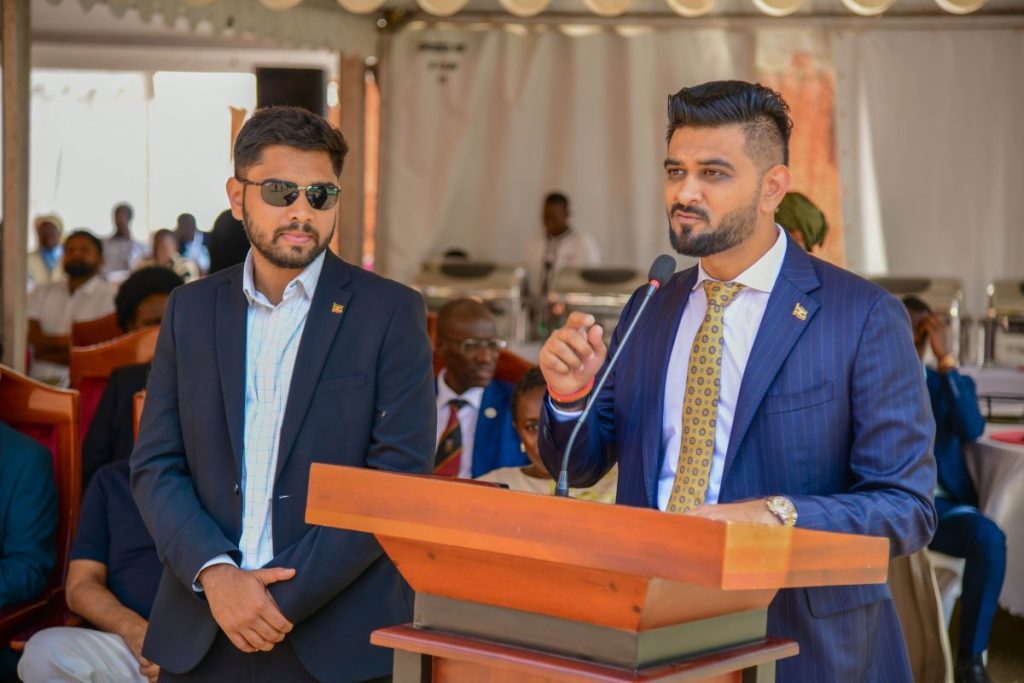
Mr. Manish Varsani who represented the Patel family took the first lady through how Mr. Hasmukh Patel started the idea of donating the building to Makerere. He explained that, Mr. Patel intended to present a gift that was coming from the bottom of his heart, and he teamed up with General Muhoozi who led him to Prof. Nawangwe’s office.
He also recalled when Mr. Patel met H.E President Yoweri Kaguta Museveni Museveni in Bukoto where he (Patel) had donated a building to a school and told the President that he would want to donate the same building to Makerere University as a gift to the First Lady Janet Museveni because he loved her so much, and in response, the President said he would take the message back to the First Lady.
The Guild President Lubega Vincent Nsamba asked the First Lady to consider constructing another hall of residence for the female students to solve what he described as an accommodation imbalance.
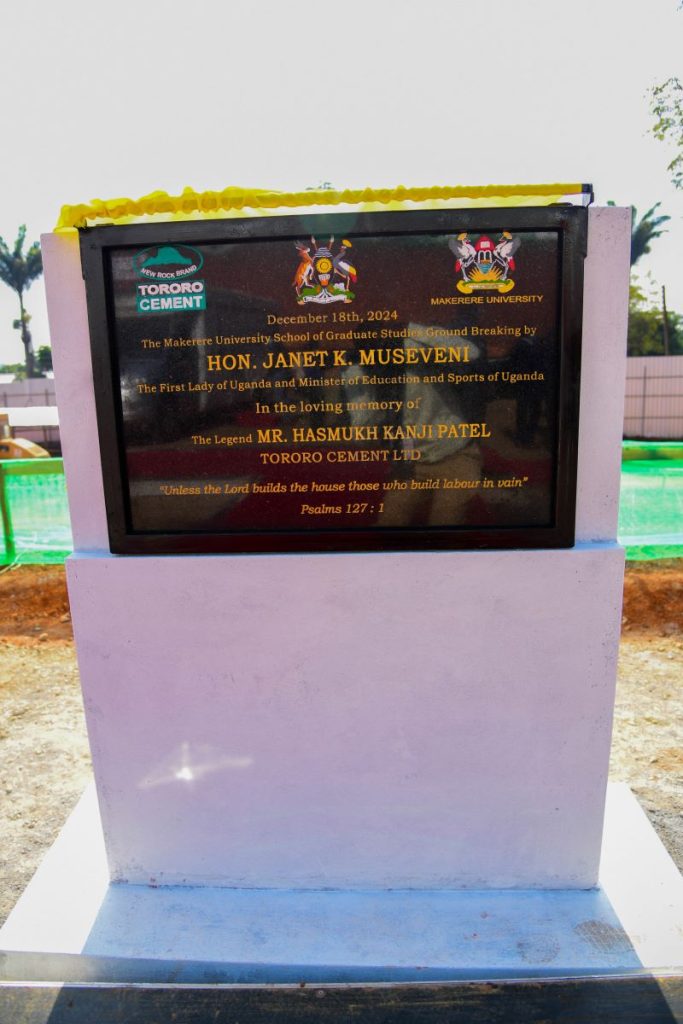
“Maama Janet Museveni, allow me to report to you that we still have only three halls of residence gazetted for female students against the six halls of residence gazetted for male students. These halls of residences were built back in colonial and independent times when the female students were fewer compared to their male counterparts, and to me Maama, this accommodation imbalance is something that should be addressed,” he stated.
“To me Maama, this speaks to the sense of how there is a dire need to invest in another additional hall of residence for the girl child here at Makerere University, and Maama, without any fear of contradiction, we humbly request that you consider building an additional hall of residence named after you in recognition of the contribution and honor of the service you have made for this country as a mother and as an educator,” he said.
You may like
-


CAES Presents Overall Best Performing Student in the Sciences & a Record 28 PhDs at the 76th Graduation Ceremony
-


Over 9,200 to graduate at Makerere University’s 76th Graduation
-


Philliph Acaye and the Making of Uganda’s Environmental Health Workforce
-


Mak Selected to Host Alliance for African Partnership Africa Office
-


Meet Najjuka Whitney, The Girl Who Missed Law and Found Her Voice
-


Makerere University School of Public Health Graduates First Cohort of Cost-Effectiveness Analysis Short Course
General
Graduation marks the next phase of accountability, graduates told
Published
1 day agoon
February 25, 2026
“A degree is not a finish line. Graduation is not the end of learning, It is the beginning of accountability,” Prof. Nicholas Ozor, the Executive Director of the African Technology Policy Studies Network Nairobi, Kenya (ATPS), said.
Delivering a keynote address under the theme ‘Knowledge with purpose’, during Makerere University’s 76th graduation ceremony on Tuesday 24th February, Prof Ozor, challenged graduates to see their degrees not as status symbols, but as instruments of responsibility.
In his speech, he painted a candid picture of the world the graduates are stepping into, one marked by climate change, technological disruption, inequality, food insecurity and the rapid spread of misinformation. Yet rather than framing these challenges as obstacles, he described them as opportunities for purposeful leadership.
“Into this world, you step, armed with knowledge, credentials, and potential. Your degrees do not make you better than others. They make you responsible for others,” Prof Ozor, said.
Addressing graduands from College of Agricultural and Environmental Sciences (CAES)
College of Computing and Information Sciences (CoCIS), College of Education and External Studies (CEES) and School of Law (SoL), Prof. Ozor tailored his message to each field of study.
To graduates of the School of Law, he described the legal profession as a moral calling, urging them to use the law to protect the vulnerable and uphold justice with courage.
“Uganda, Africa, and the world do not need lawyers who only know how to argue. They need lawyers who know why they argue. Use the law to protect the weak, not intimidate them. Use your knowledge to defend justice, not delay it. Let integrity define your reputation not merely your résumé,” Prof Ozor, said.
For graduands who might feel that shortcuts will be tempting and silence will feel safer than truth, Prof. Ozor reminded them that justice does not need clever people, but courageous ones.
To the College of Education and External Studies, he underscored the transformative power of teachers, reminding them that classrooms shape nations long before policies do.
“Every nation rises and falls on the quality of its teachers. Never underestimate the power of a classroom. Teach not only for examinations, but for understanding. Teach not only content, but character. Teach learners how to think not what to think. Education is quiet work but its impact echoes across generations,” Prof Ozor, noted.
He called upon graduands from the College of Computing and Information Sciences, to use technology to solve African problems, not merely to imitate foreign solutions.
“Technology is powerful, but it is not neutral. Every line of code carries values. Every system you design affects real lives. Build for inclusion. Build for accessibility. Build for truth. Do not let innovation outrun ethics. The future will not belong to those who know the most technology, but to those who use it wisely,” He noted.
During the ceremony, Prof Ozor announced that the African Technology Policy Studies Network is offering PhD scholarships and postdoctoral fellowships in Artificial Intelligence, inviting deeper collaboration with Makerere.
For graduates of the College of Agricultural and Environmental Sciences, he highlighted their critical role at the intersection of sustainability and survival, calling on them to blend indigenous knowledge with scientific innovation to secure Africa’s food systems and protect its ecosystems.
In closing, he reminded graduands that their integrity will open doors their degrees cannot, their humility will teach them lessons success never will, and their resilience will matter more than their grades.
Five principles to be remembered:
- Embrace lifelong learning. The world changes too fast for static knowledge.
- Choose purpose over comfort. Impact matters more than income.
- Build character before career. Skills get you hired; character sustains you.
- Serve something larger than yourself. Give back to your communities and your country.
- Believe in Africa, and act. Do not wait for solutions from elsewhere. Be the solution.
General
Over 9,200 to graduate at Makerere University’s 76th Graduation
Published
2 days agoon
February 24, 2026
Pomp and colour defined the opening day of the Makerere University’s 76th Graduation Ceremony as thousands gathered to celebrate academic excellence and new beginnings.
The historic ceremony has brought together scholars, families, friends and industry partners in a vibrant celebration of achievement and possibility. Throughout the four-day event, the University will confer degrees and award diplomas to 9,295 graduands in recognition of their dedication and hard work.
Among the graduates, 213 will receive Doctor of Philosophy (PhD) degrees, 2,503 will graduate with Master’s degrees, and 6,343 will earn Bachelor’s degrees. In addition, 206 students will graduate with postgraduate diplomas, while 30 will be awarded undergraduate diplomas.
Of the total number of graduands, 4,262 are female and 5,033 are male. According to Vice Chancellor, this marks the first time in 15 years that male graduands have outnumbered their female counterparts.
The best overall graduand in the Sciences, Esther Ziribaggwa, graduated on the opening day with the Bachelor of Agricultural and Rural Innovation and an impressive Cumulative Grade Point Average (CGPA) of 4.77.

The ceremony marks a proud moment for Makerere University as it continues to nurture top-tier professionals across diverse fields.
While presiding over the graduation, the State Minister for Primary Education, Hon. Dr. Joyce Moriku Kaducu, on behalf of the First Lady and Minister of Education and Sports, Hon. Janet Kataaha Museveni, pointed out that Makerere University is a model institution, where leaders are nurtured, scholars are sharpened, and where dreams have been given direction.
In her address, Hon. Museveni, highlighted Government’s deliberate investment in research, innovation, and infrastructure to strengthen higher education in Uganda.
“The establishment of the Makerere University Research and Innovation Fund (RIF), supports high-impact research and innovation that directly contributes to national priorities and development. Through this initiative, thousands of researchers and innovators have pursued practical, scalable solutions that are transforming communities and key sectors across Uganda,” Mrs Museveni, said.
The Minister also noted that Parliament’s approved a USD 162 million concessional loan to upgrade science, technology, and innovation infrastructure at Makerere University. The funding will facilitate the construction of modern laboratories, smart classrooms, and state-of-the-art facilities for Engineering and Health Sciences, investments expected to position the University firmly within the Fourth Industrial Revolution.
“Government has embarked on the construction of a National Stadium at Makerere University and other institutions of higher learning across the country. This will promote physical education, strengthen talent identification, and boost investment in the sports sector,”

Turning to the graduands, the Minister encouraged them to see themselves not merely as job seekers, but as job creators and solution-makers.
Uganda and Africa need innovators who will modernize agriculture; engineers who will build quality infrastructure; healthcare professionals who will strengthen health systems; and educators who will inspire the next generation,” the Honourable Minister said.
She reminded graduates that they are entering a rapidly changing world shaped by Artificial Intelligence, climate change, and shifting global markets. To thrive, she advised them to remain adaptable, creative, and committed to lifelong learning.
She also encouraged graduates interested in entrepreneurship to tap into the Government’s Parish Development Model, which provides community-based financing and production support.
Quoting Proverbs 3:5–6, the Minister urged the graduates to trust in God as they embark on their next chapter.
She extended special appreciation to the Mastercard Foundation for its 13-year partnership with Makerere University in expanding access to education and empowering young people in Uganda and beyond.
In his speech, the Chancellor of Makerere University, Dr Crispus Kiyonga, urged graduands to harness research, innovation and technology to drive Uganda’s transformation.

“This is a milestone in your lives. You have invested time, discipline and hard work to attain these qualifications. It is important that you derive value from this achievement, not only for yourselves, but for your families and for society.” Dr Kiyonga, said.
Dr. Kiyonga expressed gratitude to the Government of Uganda for its continued financial support to the University, particularly the funding allocated under MakRIF, which he described as critical in strengthening the institution’s research capacity.
“Research plays a very vital role in the development of any community. Makerere as the oldest University in the country is doing a significant amount of research, However, more work is required to mobilize additional resources to further strengthen research at the University.” Dr Kiyonga, noted.
Acknowledging the challenges of a competitive job market, Dr. Kiyonga encouraged graduates to think beyond traditional employment pathways.
“It is true that the job market may not absorb all of you immediately. But the knowledge you have acquired is empowering. You can create work for yourselves, individually or in teams.” Dr Kiyonga, said.
He advised the graduands to embrace discipline, integrity and adaptability in the workplace, and to take advantage of technology and digital platforms to innovate and respond to societal challenges.
“Every development challenge presents an opportunity. Believe that you can apply your knowledge to create solutions with impact.” He said.
Addressing the congregation, the Vice Chancellor, Prof Barnabas Nawangwe, congratulated the graduands, particularly staff and societal leaders on their respective achievements.

“I congratulate all our graduands upon reaching this milestone. In a special way I congratulate the members of staff, Ministers, and Members of Parliament that are graduating today as well as children and spouses of members of staff,” Prof Nawangwe, said.
In his speech, Prof Nawangwe, recognized outstanding PhD students, particularly members of staff. who completed their PhDs in record time without even taking leave from their duties.
He called upon graduates not to despise humble beginnings but rather reflect on the immense opportunities around them and rise to the occasion as entrepreneurs.
“You are all graduating with disciplines that are needed by society. We have equipped you with the knowledge and skills that will make you employable or create your own businesses and employ others. Do not despair if you cannot find employment. Instead, reflect on the immense opportunities around you and rise to the occasion as an entrepreneur,” Prof Nawangwe, said.
Prof Nawangwe called upon the graduands of PhDs to use their degrees to transform the African continent.
“As you leave the gates of Makerere I urge you to put to good use the knowledge you have received from one of the best universities in the World to improve yourselves, your families, your communities, your Country and humanity. Let people see you and know that you are a Makerere alumnus because of the way you carry yourself in society with dignity and integrity. Put your trust in God and honour your parents and opportunities will be opened for you,” Prof Nawangwe, said.
Delivering a key note address, Prof. Nicholas Ozor, the Executive Director of the African Technology Policy Studies Network Nairobi, Kenya ((ATPS). Reminded the graduates that a degree is not a finish line but the beginning of accountability. “The world is a complex, fast changing and deeply unequal. Degrees make you responsible for others not better than them,” Prof Ozor, said.

The 76th Graduation Ceremony of Makerere University will be held from Tuesday 24th to Friday 27th February, 2026. A total of 213 PhDs (87 female, 126 male), 2,503 Masters (1,087 female, 1,416 male), 206 Postgraduate Diplomas (80 female, 126 male), 6,343 Undergraduate Degrees (2,999 female, 3,344 male), and 30 Undergraduate Diplomas (9 female, 21 male) will be graduating from all the Colleges.
Ms. Sarah Aloyo and Ms. Nakato Dorothy both students of the Bachelor of Procurement and Supply Chain Management emerged as the best in the Humanities and Best Overall students with a CGPA of 4.93. Mr. Ssewalu Abdul, a Bachelor of Leisure and Hospitality Management student emerged second best in the Humanities with a CGPA 4.90. Ms. Esther Ziribaggwa emerged as the best student in the Sciences with a CGPA of 4.77 in the Bachelor of Agricultural and Rural Innovation, while Mr. Simon Mungudit emerged second best in the Sciences with a CGPA of 4.76 in the Bachelor of Science in Petroleum Geoscience and Production.
Commencement Speakers
- Day 1 – Prof. Nicholas Ozor, the Executive Director of the African Technology Policy Studies Network, Nairobi, Kenya
- Day 2 – Prof. Dr. Maggie Kigozi, Chairperson Makerere University Endowment Fund Board
- Day 3 – Dr. Patricia Adongo Ojangole, Managing Director, Uganda Development Bank Limited
- Day 4 – Ms. Reeta Roy, Former President & Chief Executive Officer, Mastercard Foundation
The 76th Graduation Ceremony will be held at the Freedom Square following the schedule below:
Tuesday, 24th February, 2026
College of Agricultural and Environmental Sciences (CAES)
College of Computing and Information Sciences (CoCIS)
College of Education and External Studies (CEES)
School of Law (SoL)
Livestream Link for Day 1: https://youtube.com/live/wVGPA0FJ9pU
Wednesday, 25th February, 2026
College of Health Sciences (CHS)
College of Natural Sciences (CoNAS)
College of Veterinary Medicine, Animal Resources and Bio-security (CoVAB)
School of Public Health (SPH)
Thursday, 26th February, 2026
Makerere University Business School (MUBS)
College of Business and Management Sciences (CoBAMS)
Friday, 27th February, 2026
College of Engineering, Design, Art and Technology (CEDAT)
College of Humanities and Social Sciences (CHUSS)
Institute of Gender and Development Studies (IGDS)
Makerere Institute of Social Research (MISR)
Trending
-

 Humanities & Social Sciences3 days ago
Humanities & Social Sciences3 days agoMeet Najjuka Whitney, The Girl Who Missed Law and Found Her Voice
-

 Health1 week ago
Health1 week agoUganda has until 2030 to end Open Defecation as Ntaro’s PhD Examines Kabale’s Progress
-

 Agriculture & Environment6 days ago
Agriculture & Environment6 days agoUganda Martyrs Namugongo Students Turn Organic Waste into Soap in an Innovative School Project on Sustainable Waste Management
-

 General1 week ago
General1 week agoMastercard Foundation Scholars embrace and honour their rich cultural diversity
-

 Health2 weeks ago
Health2 weeks agoCall for Applications: Short Course in Molecular Diagnostics March 2026
